Optimization of the training process of football players in higher education establishments on the basis of programming
DOI:
https://doi.org/10.15391/si.2019-4.13Keywords:
program, algorithm, preparatory period, training means, load componentsAbstract
The purpose of the study is to
experimentally substantiate the effectiveness of constructing the training process of football players
in the preparatory period of the annual training cycle in higher education establishments on the
basis of the programming method. Methodology. The following methods were used to obtain
objective results in the research process: theoretical analysis of scientific and methodological
literature, pedagogical observation, pedagogical testing, pedagogical experiment, methods of
mathematical statistics. The pedagogical experiment lasted for the preparatory period of the 2018-
2019 season (september-october 2018). The study involved 18 players of the men's team of Glukhiv
National Pedagogical University named after Oleksandr Dovzhenko aged 18-22 years with the
qualification of the I-II category. We conducted pedagogical testing of the studied players at the
beginning and at the end of the experiment using long jump test, 7x50m shuttle run, Cooper test, 30
m running and dribbling, ball striking. Results: a program was developed that provided for the
regulation of the components of the load, which was crucial for the formation of training effects in
players using an algorithm that formed the program of training the students of the student team in
the preparatory period. Conclusions. Unlike traditional planning, which defines only the general
parameters of the training process, a program of the preparatory period was developed for the
students' team players according to the corresponding algorithm. It was detailed in training
programs with regulation of load components, the parameters of which were selected for the
formation of players’ training effects. Statistically significant (p<0,05) improvement of most
indicators of football players' special abilities during the preparatory period within the range of 1,4
– 1,8 % is the evidence of the effectiveness of the developed training program.
References
Верхошанский, Ю. В. (1985). Программирование и организация тренировочного процесса.М.: Физкультура и спорт.
Врублевский, Е. П. (2011). Теоретико-методическое обоснование программирования макроцикла подготовки спортсменок, специализирующихся в скоростно-силовых видах легкой атлетики. Слобожанський науково-спортивний вісник, 4, 74-77.
Козіна, Ж. Л. (2010). Теоретико-методичні основи індивідуалізації навчально-тренувального процесу спортсменів в ігрових видах спорту. (Doctoral dissertation).Київ, Україна.
Костюкевич, В. М. (2016). Управление тренировочным процессом футболистов в годичном цикле подготовки. К.: КНТ.
Малиновский, С. В. (1976). Программированное обучение и спорт. М.: Физкультура и спорт.
Николаенко, В. В. (2014). Рациональная система многолетней подготовки футболистов к достижению высшего спортивного мастерства. К.: Саммит-книга.
Платонов, В. Н. (2013). Периодизация спортивной тренировки. Общая теория и её практическое применение. К. : Олимпийская література.
Шамардін, В. М. (2013). Технологія управління системою багаторічної підготовки футбольних команд вищої кваліфікації. (Doctoral dissertation). Львів, Україна
Щепотіна, Н. Ю., Поліщук, В. М., & Костюкевич В. М. (Ed). (2018). Управління тренувальним процесом кваліфікованих волейболісток на основі методів моделювання. Теоретико-методичні основи управління процесом підготовки спортсменів різної кваліфікації. Вінниця: ТОВ «Планер».
Bangsbo, J. (2000). Soccer system and strategies. Illinois: Human Kinetic.
Bompa, T. O., & Haff, G. G. (2009). Periodization: Theory and Methodology of Training.
Champaign, IL, USA: Human Kinetics,. 411 р.
Karsten, B., Larumbe-Zabala, E., Kandemir, G., Hazir, T., Klose, A., & Naclerio, F. (2016). The Effects of a 6-Week Strength Training on Critical Velocity, Anaerobic Running Distance, 30-M Sprint and Yo-Yo Intermittent Running Test Performances in Male Soccer Players.
International journal of sports physiology and performance, 11 (1), 80-85.
Kostiukevich, V. M., Stasiuk, V. A., Shchepotina, N. Yu., & Dyachenko, A. A. (2017).
Programming of skilled football players training process in the second cycle of specially created training during the year. Physical education of students. 21(6), 262-269. doi:10.15561/20755279.2017.0602.
Kostyukevych, V. M. (2013.) The construction of the training process highly skilled athletes in soccer and field hockey in the annual cycle of training. Pedagogics, Psychology, MedicalBiological Problems Of Physical Training And Sports, 17(8), 51-55. doi:10.6084/m9.figshare.750446.
Wilmore, I. H., Costill, D. L., & Kenney, L. W. (2012). Physiology of sport and exercise. Illinois: Human Kinetics.













